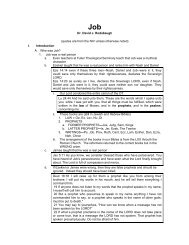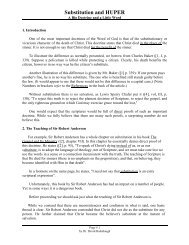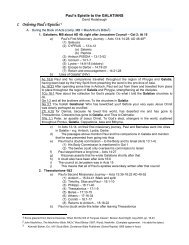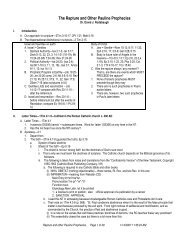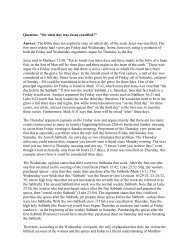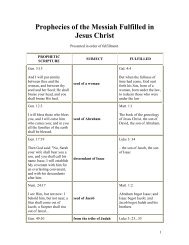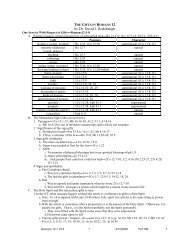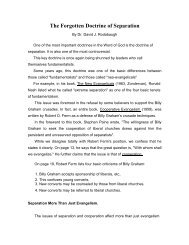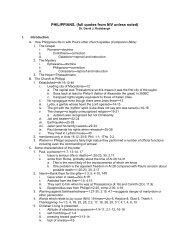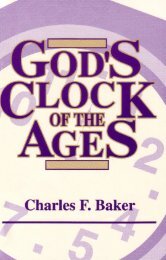Download - Hope of the Glory
Download - Hope of the Glory
Download - Hope of the Glory
You also want an ePaper? Increase the reach of your titles
YUMPU automatically turns print PDFs into web optimized ePapers that Google loves.
Selected Bible Treasures - 39 -<br />
- 40 -<br />
Selected Bible Treasures<br />
considers <strong>the</strong> issues to be clear: John 11:50; Gal,<br />
3:13; Mark 14:24 2 Cor, 5:15; Rom, 5:6, ff; 8:32; Titus<br />
2 :14; Heb, 2:9; etc, Regarding <strong>the</strong>se passages, he<br />
even states, ". , <strong>the</strong>re is no room left for protest from<br />
<strong>the</strong> side <strong>of</strong> grammar," Expressions like this occur<br />
several times in connection with <strong>the</strong>se passages. On<br />
page 41, he concludes, "<strong>the</strong> presumption is now in<br />
favour <strong>of</strong> <strong>the</strong> use <strong>of</strong> huper for <strong>the</strong> idea <strong>of</strong> substitution."<br />
What a fantastic parallel! A scribe writes in <strong>the</strong> place <strong>of</strong> an<br />
illiterate who is helpless: Christ died in <strong>the</strong> place <strong>of</strong><br />
totally depraved sinners who are spiritually helpless.<br />
Why?<br />
When <strong>the</strong> truth is so clear, we naturally ask why men<br />
would try to avoid it. Robertson clearly asserts <strong>the</strong><br />
reason is <strong>the</strong>ological prejudice [3]. Exactly <strong>the</strong> nature<br />
<strong>of</strong> <strong>the</strong> prejudice he does not give.<br />
Sir Robert Anderson's motives are clear ([2], chapter VII),<br />
He wants to tell <strong>the</strong> unregenerate that Christ died for<br />
<strong>the</strong>m. He realizes, however, that it is logically<br />
inconsistent to teach that Christ is <strong>the</strong> substitute for<br />
any who die unsaved and go to hell. Several times he<br />
states his opposition to a salvation which was, even in<br />
<strong>the</strong> mind <strong>of</strong> God, settled at <strong>the</strong> time <strong>of</strong> Calvary. In<br />
short, his opposition to <strong>the</strong> doctrine <strong>of</strong> Particular<br />
Redemption forms <strong>the</strong> bases for what he says about<br />
huper.<br />
Interestingly enough, Lewis Sperry Chafer who also did<br />
not believe in Particular Redemption, did teach that<br />
huper conveys <strong>the</strong> thought <strong>of</strong> substitution in Rom, 5:6-<br />
8, 2 Cor. 5:14-15, 21, Gal. 3:13, et, al, ([4], Vow. III, p,<br />
57.<br />
Unfortunately, much <strong>of</strong> <strong>the</strong> view <strong>of</strong> Sir Robert Anderson is<br />
found in Baker's Dispensational Theology , ([1], pp.<br />
340--342). Indeed, typology is even given first as<br />
support for <strong>the</strong> doctrine <strong>of</strong> substitution.<br />
4. In Our Place<br />
Thank God! We rejoice that huper clearly means "instead<br />
<strong>of</strong>, 'in <strong>the</strong> place <strong>of</strong>' when referring to <strong>the</strong> death <strong>of</strong><br />
Christ.<br />
Thank God! This means that this important doctrine<br />
does not rest on some indirect argument <strong>of</strong> typology<br />
but is taught directly and frequently in <strong>the</strong> Greek New<br />
Testament.<br />
Here is a partial list <strong>of</strong> verses that are clear on <strong>the</strong> issue:<br />
"For when we were yet without strength, in due time<br />
Christ died in <strong>the</strong> place <strong>of</strong> ungodly ones. For scarcely<br />
in <strong>the</strong> place <strong>of</strong> a righteous man will one die; perhaps<br />
in <strong>the</strong> place <strong>of</strong> a good man some would even dare to<br />
die, But God commendeth his love toward us, in that,<br />
while we were yet sinners, Christ died in our place"<br />
(Rom, 5:6-8)<br />
", , . this is (represents) my body which was broken in<br />
your place , , ," !(1 Cor.11:24)<br />
"For <strong>the</strong> love <strong>of</strong> Christ constrains us because we are<br />
convinced that if one died in <strong>the</strong> place <strong>of</strong> all <strong>the</strong>n <strong>the</strong><br />
all died. And he died in <strong>the</strong> place <strong>of</strong> all in order that<br />
those who live should no longer live to <strong>the</strong>mselves but<br />
to <strong>the</strong> one who died in <strong>the</strong>ir place and was raised," (2<br />
Cor. 5;14,15),<br />
"For he (God) made him who knew no sin to be made sin<br />
in our place in order that we might become <strong>the</strong><br />
righteousness <strong>of</strong> God in him." (2 Cor. 5:21). (The<br />
reader might be interested in <strong>the</strong> fact that many have<br />
urged <strong>the</strong> meaning "sin <strong>of</strong>fering" for <strong>the</strong> second "sin"<br />
in this verse. Thus, even <strong>the</strong> types <strong>of</strong> [1,2] would force<br />
huper to mean "in <strong>the</strong> place <strong>of</strong>" here.)<br />
gave himself in my place" (Gal. 2:20),<br />
" being made a curse in our place..." (Gal 3:l3).<br />
given himself in our place (Eph. 5:26).<br />
" Who gave himself in our place . , ." (Titus 2:l4),




